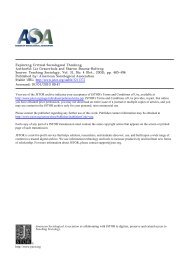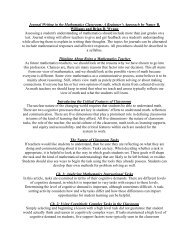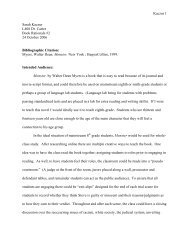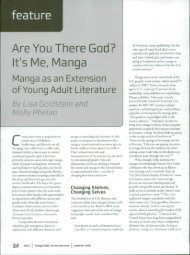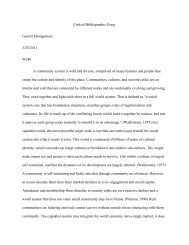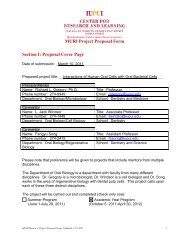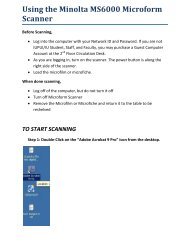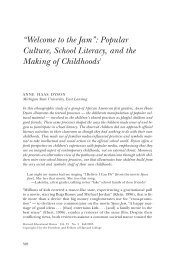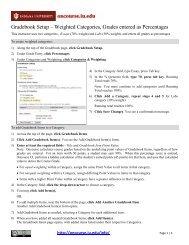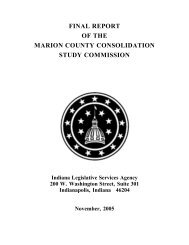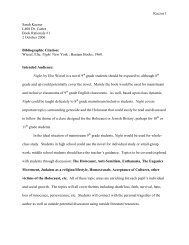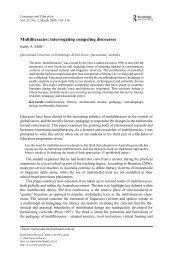A road map for reading specialists entering schools ... - Oncourse
A road map for reading specialists entering schools ... - Oncourse
A road map for reading specialists entering schools ... - Oncourse
Create successful ePaper yourself
Turn your PDF publications into a flip-book with our unique Google optimized e-Paper software.
Providing in<strong>for</strong>mation about anticipated changesin students' literacy behaviors rein<strong>for</strong>ced this conceptualframework.Ongoing and specific feedbackTeachers were provided with regular and specificsupport during postobservation conferencesand grade-level meetings. Their concerns were addressedas they surfaced. Providing immediatefeedback allowed me to sustain the momentum andmanage dilemmas related to implementation andcontinuation of activities. Being welcomed as asupport structure <strong>for</strong> teachers or encountering theirresistance can be factors that potentially inlluencewhether the support provided by the <strong>reading</strong> <strong>specialists</strong>ucceeds or fails to yield desired <strong>reading</strong>achievement outcomes.Emphasis on culturally in<strong>for</strong>med teachingThe teachers found the emphasis on providingculturally in<strong>for</strong>med teaching useful <strong>for</strong> helpingthem to advance their students' literacies. Culturallyin<strong>for</strong>med teaching uses students" culture as a frameof reference to facilitate learning. Curriculum materialsthat reflected the students* culture were selectedas the primary texts. In some instances, thecurriculum materials reflected both the students"African American identities and their adolescentidentities. This allowed the teachers to use literatureto address concerns specific to their students. Thematerials also facilitated literature mediations thatbridged the gap between the students" in-school andout-of-school literacies.Learning the lessonsWith increasing demand <strong>for</strong> highly qualified<strong>reading</strong> <strong>specialists</strong> throughout the United Statesand the need to increase <strong>reading</strong> achievement insome of the nation"s lowest per<strong>for</strong>ming <strong>schools</strong>,many <strong>reading</strong> <strong>specialists</strong> will begin their work in<strong>schools</strong> without exemplary <strong>reading</strong> programs.There are points of convergence <strong>for</strong> all <strong>reading</strong> <strong>specialists</strong>without regard to the presence of an exemplary<strong>reading</strong> program. Namely, <strong>specialists</strong> needto be a resource to teachers, work effectively withallied professionals and parents, have solid knowledgeabout instructional practices, have familiaritywith multiple <strong>for</strong>ms of assessment, provide diagnosticteaching, and be able to work with students.These were the lessons provided to us by <strong>reading</strong><strong>specialists</strong> from <strong>schools</strong> with exemplary programs(Bean etal., 2003).However, it is quite plausible that most <strong>reading</strong><strong>specialists</strong> will not be found in such <strong>schools</strong>. Thepoint of this article is to expand on the lessons providedby Bean et al. (2003) by sharing insights thatemerged from my work as a <strong>reading</strong> specialist in aschool that initially did not have an exemplary<strong>reading</strong> program. I end with seven quick lessonsthat were illuminated throughout the article.Lesson 1: In the absence of exemplary <strong>reading</strong>programs <strong>reading</strong> <strong>specialists</strong> must be able to establishone. The process can be essentially messyand complex and require months to accomplish.Patience is key.Lesson 2: A <strong>reading</strong> specialist who does notenter a fully "fixed"" and defined role must be ableto negotiate his or her identity.Lesson 3: Being reflective is essential <strong>for</strong> <strong>reading</strong><strong>specialists</strong>. This may lead to rethinking rolesand functions and establishing new goals basedon self-examination and continual professionaldevelopment.Lesson 4: There may be a need to align the roleof the <strong>reading</strong> specialist with the school context. Itwill be necessary <strong>for</strong> many <strong>reading</strong> <strong>specialists</strong> tounderstand cultural and contextual <strong>for</strong>ces that operateinside and outside of the <strong>schools</strong> in whichthey work. This might include moving toward anincreased understanding of theories of pedagogyand curriculum orientations suitable <strong>for</strong> the studentsand teachers at a particular school.Lesson 5: Being an effective <strong>reading</strong> specialistinvolves establishing measurable goals andplanning instructional enhancements. In some cases,theoretical enhancements might be necessary<strong>for</strong> helping teachers reconceptualize the role of literacyinstruction, developing a comprehensive assessmentprofile to identify students" strengths andweaknesses, offering teachers a core group of instructionalstrategies to teach students, and selectingappropriate curriculum materials and resources.Lesson 6: Reading <strong>specialists</strong> should be able tosustain the momentum of their ef<strong>for</strong>ts to supportteachers and students. This may require using variousprofessional development processes and materials.A roud tnup/or <strong>reading</strong> spccialifits cutering <strong>schools</strong> without txemplury <strong>reading</strong> progrurns



